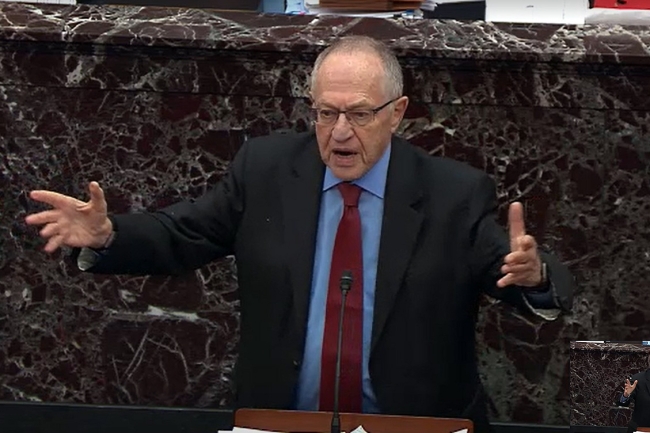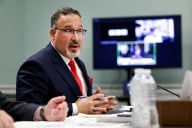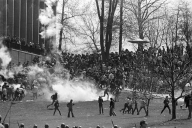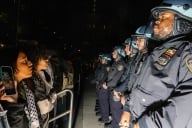You have /5 articles left.
Sign up for a free account or log in.

Alan M. Dershowitz at the Trump impeachment trial
Getty Images
A recent article in Inside Higher Ed, “The ‘Dersh’ Stands Alone,” contended that my legal arguments against impeaching Donald Trump have thrust me “even farther into academe’s margins.” But the real question is how many of the law professors who have attacked my constitutional views would have done so if I had made the identical constitutional arguments on behalf of a President Hillary Clinton who had been impeached for abuse of power.
Those of us who have been in academe for a long time -- in my case, more than half a century -- know the answer. Many professors disguise their partisan political views as expert scholarship. This is well-known within academe, but not so much in the outside world.
Not only did I vote for Hillary Clinton, but I also started my research on impeachment in the summer of 2016, when it looked like she would be elected president and the Republicans were threatening to impeach her on day one. I was planning then to write a book entitled The Case Against Impeaching Hillary Clinton, in which I would have essentially made the same arguments I am now making. Had I done so, many of these same professors would be praising me for my original research.
Among those would be Nikolas Bowie, assistant professor at Harvard Law School, who wrote an article in the Harvard Law Review Forum in which he unequivocally stated that Justice Benjamin Curtis was correct in concluding that a crime was required for impeachment. Dean Theodore Dwight of the Columbia Law School similarly wrote in the run-up to the Andrew Johnson impeachment trial that the weight of authority was on the side of impeachment requiring a criminal act. But when I cited Bowie in support of my claim that criminal conduct was required, he felt it necessary to distance himself from me in the media, which is perfectly fine, but he mendaciously omitted any reference to his previously stated view that a crime is required. This is all too typical of the politicized “scholarship” that we are experiencing during the Trump era.
Because I refuse to be influenced in my scholarly research by partisan considerations, I have been marginalized by those in academe to whom partisan politics comes before honest scholarship. Instead of responding to my hourlong argument in the U.S. Senate with substantive arguments, professors like Frank O. Bowman III and Laurence Tribe engage in ad hominem attacks, lying about my background, claiming that I have “never done any serious legal scholarship.” This lie is rebutted by a review of my academic writings, which include numerous law review articles on prevention in criminal law, law and psychiatry, the Fifth Amendment, bail, capital punishment, the mathematics of prediction, plea bargaining, pre-emption, the history of the Declaration of Independence, the relationship between the first book of the Bible and the common law, the First Amendment, and numerous other scholarly books and articles. Yes, I write op-eds for The Wall Street Journal, The New York Times and other publications, but those have always been in addition to my 40 books and other academic writings.
Another lie that is being disseminated by some academics is that I have argued that it would not be impeachable for a president to commit serious crimes if his motive was to be re-elected in the public interest. I never said anything like that, as can be proved by simply watching or reading what I actually said: namely that a president can be impeached if he engages in conduct that is “in some way illegal,” “corrupt” or involving “personal pecuniary” gain, such as a “kickback.” These “scholars” are willing to tell outright lies to promote partisan interests. Real scholars don’t deliberately distort what others say. Shame on them.
I have done independent scholarly research on the history of the impeachment provisions of the Constitution, and I have come to a different conclusion than most of my academic colleagues. In the normal course of events, that might stimulate debates on the merits of my views, but instead Tribe and Bowman have led a campaign of schoolyard name-calling and unscholarly ad hominems. I challenge Tribe and Bowman to a Lincoln-Douglas-type academic debate at Harvard on the substantive issues, with only one rule: no name-calling, no ad hominems and no partisan politics.
The partisan attacks on me for deviating from the politicized academic consensus demonstrate how law school faculties around the country are heavily biased politically. Young scholars who dare to deviate from politically correct partisan scholarship are often discriminated against in the academic marketplace. They know that, and they know if they want a teaching job, they are far better off toeing the line than defying the conventional wisdom, especially on issues that are highly partisan. This creates a self-replicating faculty, which is good for neither academe nor America in general. This, too, is an issue worthy of serious scholarship rather than name-calling.








